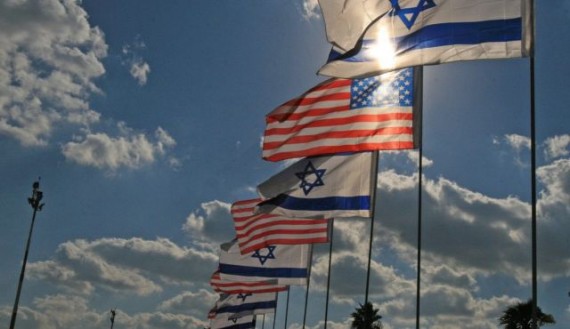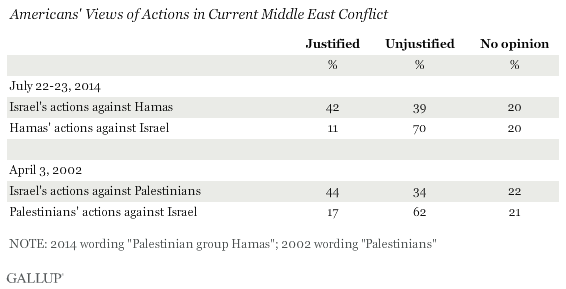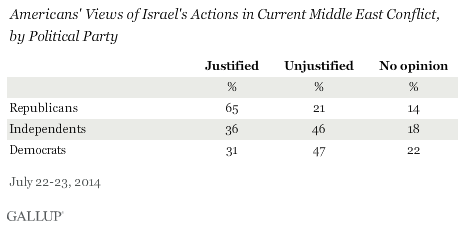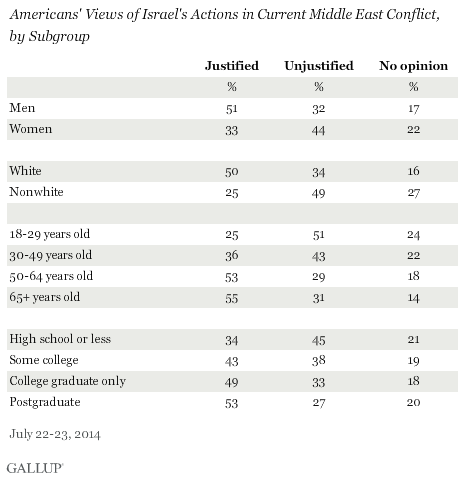Americans Divided On Israel’s Actions In Gaza
A new poll shows that Americans are divided over Israel's actions in Gaza, but this most likely will not impact relations between the two countries.
With the conflict between Israel and Hamas showing no sign of ending and the United States trying mostly in vain to negotiate a cease fire, a new Gallup poll finds that Americans are split on whether or not Israel’s actions are justified, with the deepest divides on the question mirroring the same partisan an demographic divides we’ve seen on so many other issues:
PRINCETON, NJ — Americans are divided in their views of whether Israel’s actions against the Palestinian group Hamas is “mostly justified” or “mostly unjustified,” but they widely view Hamas’ actions as mostly unjustified. Those results are similar to what Gallup measured 12 years ago during another period of heightened Israeli-Palestinian violence, and they are consistent with Americans’ generally more positive views of the Israelis than of the Palestinians.
The latest escalation of violence in the Middle East occurred after the militant Palestinian group Hamas captured and killed three Israeli students and a Palestinian teen was subsequently murdered in an alleged revenge killing. The tensions erupted into bombings, missile attacks, and armed conflict. The two sides have not agreed to a cease-fire so far despite the international community’s efforts to end the fighting.
Americans do not view the current round of violence as substantially worse than the 2002 fighting, when Israel invaded areas under Palestinian control while Palestinian suicide bombers targeted Israel. A separate question in the new July 22-23 Gallup poll underscores the finding that Americans’ see the current round of fighting as no worse than usual: 45% of Americans say the current Israeli-Palestinian conflict is “more serious than past conflicts between them,” 43% about as serious as past conflicts, and 3% as “less serious.”
This chart compares the numbers today with those of a poll taken at the time of the 2002 conflict:
Of more interest, perhaps, is the extent to which public opinion on this conflict is divided along partisan and other lines. For example, here’s the party breakdown:
The differences between Republicans and others in this poll isn’t entirely surprising, of course. Just last week, I made note of a Pew Research poll that showed thatRepublicans tended to be more supportive of Israel in general than Democrats or Independents. With that difference in opinion informing both sides of the partisan divide, the fact that Republicans tend to support Israel’s actions in Gaza more than others makes sense. Additionally, the difference we see here is probably reflective of the general support for a more strident military policy toward terrorism that we see from people who tend to self-identify as Republicans and conservatives. If they support a strong U.S. policy against terrorists, then they would be likely to do so with respect to Israel as well even after taking the issue of civilian casualties into account.
Also of interest are the demographic divides on the question, which also mirror many of the divides we see among these groups on other political issues:
Women, non-Whites, people under 50, all of these groups are less likely to approve of what Israel is doing than Men, whites, and people 50 and older. Given that the first set of groups tend to more likely identify as Democrats and Independents than Republicans, it makes sense that we’d see a demographic breakdown like this. The one demographic breakdown that doesn’t fully track with the partisan one is on education, where a higher degree of education correlates with more support for Israel’s current actions, but I’m not sure what the explanation for that might be.
Looking at these same numbers, both Daniel Larison and Guy Benson suggest that it may have implications for broader American support for Israel outside of the circumstances of this particular conflict, although Benson mostly focuses on the question of whether it will lead the Democratic Party to become less supportive of Israel in the future. I’m not sure that this poll can tell us anything in that regard, though. As the first chart above indicates, American public opinion on this conflict isn’t all that different from public opinion regarding the 2002 conflict. I suspect that if we were to look at similar date for the other periods of Israeli military incursion into Gaza in 2006 and 2012 we would see similar numbers. Despite those numbers, the American public has remained generally highly supportive of the State of Israel. Absent some major change in the situation on the ground, or a change in the way Americans view the world that I really don’t see coming, I don’t see that happening any time in the near future.
As for the fact that Americans are split on whether or not the current Gaza conflict is a good idea, that’s likely as much a reaction to the daily images of conflict and death that we are seeing as it is anything aimed particularly at Israel. Potentially, of course, that means that Israel ought to be considering its international reputation if it pushes further into Gaza, but as things stand right now it doesn’t seem to me like something they ought to be overly concerned about as a threat to the relationship between Israel and the United States.





It doesn’t surprise me that Americans are divided on this; I’m divided on this all by myself. I don’t see anything in the wording of these polls that would allow for the nuance necessary to distinguish (say) Israel’s actions against Hamas versus Israel’s indifference to collateral damage among Palestinian civilians; or the legitimacy of a Palestinian state versus the legitimacy of Hamas as a government.
I’m a little surprised to see that “No Opinion” trends down with age.
All my life there has been a low level war in Isreal and Palestine, with attrocities on both sides, and I’ve completely stopped paying attention to the details. I would expect more people to have given up on the whole region and just shrug when asked about it.
Justified or Unjustified? Does it matter? Does it change anything? Will the cycle of retribution ever end? At this point, I think it will only end with genocide or ethnic cleansing.
Hamas is evil. Israel is justified in killing them. However, not everyone in Gaza is Hamas. Israel can’t really justify (very well) killing those people who are not Hamas. Mostly, I just don’t see what kind of end game Israel is working towards. I suspect Hamas is trying to radicalize the entire population of Gaza, and it looks like Israel is helping. Might as well schedule one of these every year or two.
Steve
@steve: Gotta keep mowing the lawn, as they say.
@DrDaveT:
Do you have evidence that they are indifferent?
I feel that “impact” should not be used as a verb.
t
I think this is probably true. I have always thought that what turned a majority of Americans against the Vietnam war was nightly pictures of death and carnage. The same probably applies to Iraq although the military had learned how to manage the news better after Vietnam.
@Another Mike:
One might say it is on your screens, except in USA land it is not very much as compared to rest of world.
That the Israelis have a colonial view of the dirty Wog is fairly painfully evident.
@Ron Beasley:
I remember after the Tet Offensive seeing a picture in either Time or Newsweek showing a deuce-and-a-half loaded with our soldiers’ bodies just thrown on the back. There must have been dozens. Talk about sending a message to people, especially us college guys with S-2 deferments about to graduate.
I have seen no pictures of the damage in Israel from the thousand or so rockets fired by Hamas. On the other hand pictures of the destruction in Gaza are seemingly everywhere.
Someone gets to decide which pictures we get to see. Those who decide have the power to shape public opinion. Even a person who doesn’t really follow politics or current events probably cannot miss all the images.
Vietnam, losing the peace: http://www.youtube.com/watch?v=ugJ_59_adp8
@Another Mike:
And if you think those are anti-Israel, you need to think a bit more.
Being told about Hamas firing thousands of rockets at Israel works a lot better than contrasting images of hundreds of dead civilians in Gaza with images of damaged buildings in Israel but almost no civilian casualties.
@Another Mike: So what’s your guess on how many of the thousand killed so far are not civilians? ’cause any estimate below 90%…nah, let’s be charitable, 80%…means they’ve been kinda indifferent to it.
And, to be clear, we should define a civilian in this case as someone not actively launching rockets or fighting Israeli ground forces.
@PJ: Or images of small dents in the desert where a good lot of the rockets end up.
@Another Mike:
You mean, beyond the fact that they continue to do things that they know will kill lots of civilians?
I suppose I could moderate that to “relative indifference”, given that they seem to be unwilling to kill tens of thousands, as opposed to thousands.
@ Another Mike
Fox News is in Israel’s corner. Is Obama using mind control rays to prevent them from showing photos of the damage?
And we have not even started to discuss social media…
Do you guys think all Israelis are unanimously on board with this war? I have thought for a long time that Netanyahu has more support in the US than in Israel.
@steve:
Israel is evil. Hamas is justified killing people who are trying to ethnicly cleanse Palistinians from Gaza and the Wedt Bank.
Stop drinking the Hasbara Kool-aid.
@Slugger:
Likud has been the dominant party in Israel for almost 20 years. Yeah…I think a significant majority of Israelis are “on board” with ” this war”.
Show proof otherwise.
@Robert C:
Insofar as the present government represents ~46% of the votes, the rest going to parties not in government and largely opposed to Netanyahu, one can presume that ‘significant majority’ supporting Netanyahu policies is a gross exaggeration.
Sufficient numbers to sustain a government formation under a parliamentary system, but significant majority…
I’m sure a poll now will show support, rally-round-the-flag effect in same fashion as Hamas will benefit.
@DrDaveT:
So you have an opinion, but no evidence. Even in a just war of self-defense, innocent people will be killed. That is not evidence of indifference. Providing warnings and calling off strikes when it becomes known that civilians are in the strike zone, are just the opposite of indifference.
The vast majority of people in this country have usually supported Israel in these actions. US and Israel’s aims are usually the same. If there are people of Hamas who are against their terrorist leaders then they need to stand up and apeak to disavow them. Iran’s leadership has spoken publicly about their aim of destroying Israel and their nuclear program continues unabated.
Israel is not going to take anything off anyone, no matter what country or what extremist group: not after the 1930’s. Unfortunately a few misguided church groups in this country have made moves to divest from companies that do business with Israel, while proclaiming support for Palestinian causes (terrorists). Ironic that these denominations are the very ones that are in a financial disaster as their churches and members are leaving by the millions, tired of the political shenanigans and radical direction that these denominations have taken. So this talk of divesture rings hollow. If current trends continue, they won’t have the money to invest in lemonade stands.
“Episcopal Church In Collapse”
“Presbyterian Church – US: No Longer Relevant”
@Another Mike:
Fair enough. On the other hand, going ahead with operations that they know will kill many more civilians than combatants does seem to mitigate the effect. How many warned/deferred/canceled ops does it take to offset the op that kills a few dozen civilians?
I will happily concede that the government of Israel is not 100% indifferent to how many Palestinian civilians they kill. As I said above: relative indifference. But a just war of self-defense can only remain just for a limited time if you continue to prosecute it against noncombatants.
@DrDaveT:
I don’t know, when I think of indifferent I think of what went on in WW2 bombing.
@Another Mike:
Do you see a lot of these kind of photos?:
http://www.globalpost.com/dispatch/news/regions/middle-east/140709/these-are-the-photos-gaza-too-graphic-for-some-news-media-to-show
Ever thought about why some don’t want you to see such photos? What kind of public opinion that is being shaped by not showing these?
@DrDaveT:
A war prosecuted against noncombatants can never be a just war. Israel is fighting a war against Hamas terrorist fighters who attacked Israel and continue to attack Israel. The death of noncombatants is a secondary effect which Israel does not intend, but is unable to prevent unless it gives up its right to self-defense.
If the information here is true, then Hamas had a big surprise in store for Israel.
http://www.breitbart.com/Big-Peace/2014/07/25/Reports-Massive-Terrorist-Invasion-of-Israel-Thwarted-by-Security-Forces
@PJ:
The US media rarely shows really graphic photos. It is a cultural thing and is done out of respect. We did not see pictures either of bloody bodies of Israeli children when Palestinian suicide bombers were blowing up busses and restaurants in Israel. I lived in Turkey for a year and know how the press there covered bloody events. The sensibilities are different in that part of the world in this respect.
@PJ:
My guess is that it has much more to do with shaping bottom lines than with shaping public opinion. Everything about the major news media seems to be based primarily on that, especially now that most major media are struggling to find a business model that works in the Internet world.
Minor news sources show the whole range, from every angle (pro-Palestinian, pro-Israelie, indifferent but just like looking at war, you name it). There doesn’t seem to be any censorship going on in the US on this particular topic.
@Another Mike:
If Israel were killing 1-2 civilians out of 10 kills you would have a point. If they were killing 3-4 civilians out of 10 the point would be stretched, but arguable. The problem is we are looking at 7-9 civilians dead out of every 10 Israel kills. Even the Palestinians, despite their efforts to kill civilians, are managing a better military to civilian ration than are the Israelis. At some point results, not just intentions matter.
One has to work from some principle that goes beyond mere proportionality of combatant to noncombatant deaths. Israel has a duty to protect its citizens from attack. There is a right to self-defense. Killing noncombatants is a bad effect that is secondary to a rightful defense against aggression. The Hamas aggressors are well protected in underground tunnels and emerge when it is to their advantage. The noncombatant citizens of Gaza are left unprotected above ground to fend for themselves. This results in disproportionate noncombatant causalities. This situation is the fault of Hamas and appears to be deliberate and is intended to create causalities to win some public relations advantage. I believe everything I have just stated is already known by blog readers and hardly has to be repeated. The war will end when Hamas has been degraded to the point that it cannot launch rockets at Israel and cannot mount attacks from tunnels dug into Israel. Ending the war before these objectives are reached will almost guarantee that there will be a future war against Hamas that will be even more deadly than the present one.
You seem to leave that principle entirely out of your calculations. The danger to Israel is minimal, their response is devastating to the civilian population while doing minimal damage to Hamas. When the increased safety of Israelis is minimal the proportionality of the response to the noncombatant population should matter a whole hell of a lot.
The word should be casualties, not causalities in the my previous posting.
And now from the Washington Post a word about those civilian casualty numbers for Gaza .
“The media has engaged in journalistic malpractice by reporting casualty figures for civilians coming from Gaza as gospel. The figures come from the Gazan Ministry of Health, which is controlled by Hamas. The Ministry of Health counts everyone not in uniform as a civilian. Most Hamas fighters don’t wear uniforms. The UN is sometimes sourced for the figures, but the UN gets its figures from … the Gazan Ministry of Health. Contrary to early reports that 80% or so of the early casualties were civilians, Al-Jazeera published names and ages, and about 3/4 were men of fighting age (16-50), compared to a rough estimate of 20% of the Gazan population (40% to 50% of which is fourteen and under). Some of those men were undoubtedly civilians, but it strains credulity to believe that 80% of the casualties were civilian but just-so-happened to be overwhelmingly fighting-age men.”
http://www.washingtonpost.com/news/volokh-conspiracy/wp/2014/07/26/some-israel-gaza-notes/
@Grewgills:
The problem is that if they simply allow Hamas to send rockets without any response, some Israelies will inevitably die. At what number should they respond? And what do they say to the families of their citizens (less then the numbers in the Gaza who are currently dying) who were killed? Tough luck, just a bad lottery draw?
On the other hand, the situation in the Gaza is bad enough to create the groups wanting to send the rockets into Israel. Sometimes there simply is no good solution to a conflict until the passions die out on both sides (Ireland comes to mind).
@Lounsbury:
Hasbara BS…….the silence in Israel against the bombing of civilians in Gaza is defining.
RC
@Lounsbury:
Make that deafening.
@Grewgills:
You seem to be making judgments about the conflict and holding Israel to standards other nations would not be held to. This is troubling. You seem to also be denying Israel a right to self defense, or to a very limited right to self defense. This is also troubling.
@Another Mike:
Other nations aren’t simultaneously confining large populations into dense ghettos and then bombarding them every couple of years. (Unless there are and I’m ignorant of it. A fair possibility.)
@downvoter: I’m sorry I used a term some Israelis use for bombing Gaza.
@Another Mike:
they have every right to defend themselves.
but i dont want to pay for it.
@Another Mike:
I have a right to defend my home from invaders… but not by killing everyone who comes to the door.
If you missed the very first comment in this thread, I am conflicted about this. It is clear that Israel needs to do something. It is equally clear that a ‘something’ that involves more murder of innocents than acts of self-defense is not the right answer. You seem to think that this is OK; that the right to self-defense trumps the right to life of noncombatants. Why do you think that?
@DrDaveT:
Yes, as long as enemy noncombatants are not killed deliberately and their deaths are just an unintended consequence of justly defending oneself. The full responsibility for the deaths of noncombatants in Gaza is on Hamas, not Israel.
If you are holding Israel to a standard of war different than you would hold some other nation, then that is anti-Semitism.
@Another Mike:
Let’s take an extreme example to see where you actually come down on this. What if Israel in it’s attempt to kill terrorists in Gaza had to kill 50,000 innocent Gazans to get 1 terrorist. They only intend to kill the one terrorist, but they know their actions will result in the collateral damage of 50,000 innocent Gazans. Do you think their actions would be just? What if killing that one terrorist would predictably kill 10,000 innocent Gazans and 100 American tourists? Still justified?
@Grewgills:
The question is whether there a point where the good that you do is outweighed by the bad that you do? The answer is yes.
But I repeat what I said previously:
If you are holding Israel to a standard of war different than you would hold some other nation, then that is anti-Semitism.
Two things:
1. I am not.
2. No it isn’t. That would be one reason for holding Israel to a different standard, but not the only one. Similarly if you oppose affirmative action it could be because you are a racist, but that is not necessarily the case.
@Another Mike:
Good thing I’m not, then.
If you are holding Israel to a standard of rules of engagement different from what you would hold attackers of the Unites States to, then you’re apparently OK with ethnic cleansing.
Seriously? Anti-semitism? It’s anti-semitic to believe that nations being attacked by terrorists should not indiscriminately kill everyone in the vicinity of the terrorists, so long as they get the terrorists too? Unless, of course, you believe that there are no non-terrorist Palestinians, which seems to be the position of both Likud and you. Now who’s a racist?
@DrDaveT:
“then you’re apparently OK with ethnic cleansing.”
“indiscriminately kill everyone in the vicinity of the terrorists”
“you believe that there are no non-terrorist Palestinians”
You claim you are not and then through wild talk show the opposite.